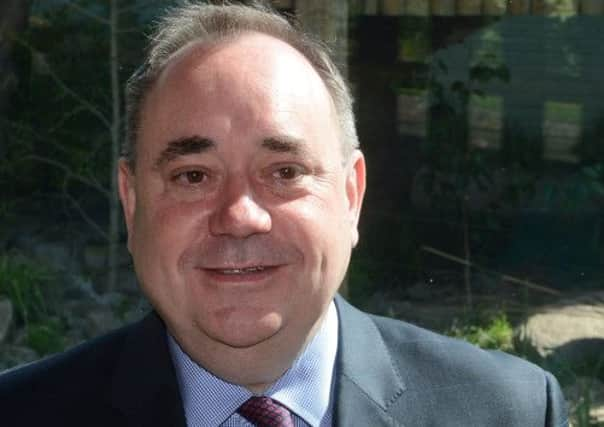Scottish independence: Burns would be Yes - Salmond


The First Minister cited the Bard’s poetry and private writings to claim Burns would have been an enthusiastic backer of the independence campaign.
He claimed letters from Burns to his friends Frances Dunlop and Dr John Moore revealed the poet’s stance on Scottish nationalism.
Advertisement
Hide AdAdvertisement
Hide AdBurns wrote to Dunlop of his “fervent prayer for old Caledonia over the hole in a blue whinstone, where Robert de Bruce fixed his royal standard on the banks of Bannockburn”.
In his letter to Moore, Burns wrote of how he had been inspired by Scottish freedom fighter William Wallace. He said: “The story of Wallace poured a Scottish prejudice in my veins which will boil alang there till the floodgates of life shut in eternal rest.”
The SNP leader claimed the letters and poems such as A parcel of rogues in a nation, which talks of how Scotland is “bought and sold for English gold”, gave a clue as to how Burns would have voted on 18 September 2014.
He said: “From tip to toe, Robert Burns was a 100 per cent Scottish patriot. No-one should ever try to pigeon-hole Burns into party politics because he was far too big for that, but it is clear from his private writings such as his letters to Mrs Dunlop and John Moore, as well as his poetry, that he always backed the nation of Scotland.”
Salmond previously invoked the words and spirit of Burns in the poem Red, Red Rose, when he said in a keynote speech ahead of the 2011 Holyrood election: “The rocks will melt with the sun before I allow tuition fees to be imposed on Scottish students.”
However, Salmond’s political opponents attacked the SNP leader’s claims as a desperate attempt to bolster support for independence.
Labour MSP Richard Baker, a director of the anti-independence campaign, dismissed his intervention and suggested Burns was more of a socialist than a nationalist.
Baker said: “It’s foolish of Alex Salmond to try to appropriate Burns for the SNP. Every Scot can find aspects of his poetry that concurs with their beliefs and much of his writing was socialist and internationalist. It’s quite wrong to suggest that Burns would have voted one particular way as Burns spoke for all Scots and all humanity.”
Advertisement
Hide AdAdvertisement
Hide AdSalmond staked his claim to the Burns’s support for independence ahead of a play that will explore through song and poetry how the poet might have voted in next year’s referendum.
Broadcaster Mark Stephen takes on the role of the Bard, with Scottish singer-songwriter Gill Bowman starring as his wife Jean Armour. The show, Robert Burns Votes for Scotland, is being shown at the Valvona & Crolla cafe and bar in Elm Row, Edinburgh, as part of this summer’s Festival.
The premise of the show sees Burns brought back to life to grapple with the issue of independence and to weigh up how he might cast his vote.
Audience members will be asked to take part in a straw poll on how they believe Burns would have voted at the end of the show. Stephen insisted that Burns would still have been undecided over how to vote on independence, even after more than two years of frenetic debate on the issue.
He said that although Burns’s “instinct would have been for independence” he would have had a “fear of the unknown” and would have searched for answers on key questions before voting. Stephen said that works of Burns covered in the play would include: A Man’s a Man for A’ That, Tam O’Shanter and Green Grow the Rushes.
He said: “Most people would assume that he would automatically vote for independence, but that isn’t necessarily the case and there is a considerable argument about what he might have done. People look at poems like Parcel of Rogues and make the assumption that he would have supported independence.”
Stephen, who has presented BBC Radio Scotland’s weekly outdoor magazine programme Out of Doors, said that the idea for the show came partly from the Scottish Government’s extension of the franchise to 16- and 17-year-olds.
The broadcaster said that “even the current SNP administration can’t enfranchise the dead” and hand Burns the vote for the referendum. He added: “We’re going to ask the audience how they think he would have voted as each performance finishes.
Advertisement
Hide AdAdvertisement
Hide Ad“Burns had a very romantic view of Scottish independence, but I genuinely don’t know how he would have voted. The vote of the audience won’t be an intellectual one – people will vote with their guts.”
Stephen concluded: “What would put him off independence would be the fear of the unknown. I think that he was by nature an independent thinker, but whether that would have led to him supporting independence I don’t know.”
Twitter: @AndrewWhitaker3